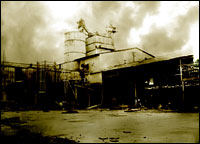
This post marks the launch of “Edible Media,” an occasional look at interesting or deplorable food journalism on the web.
Food coverage in The New York Times Sunday Magazine has been in a funk for a while now. Aside from the odd trenchant bit of commentary from Michael Pollan, the magazine’s weekly food section has been slight and generally forgettable.
This past Sunday, though, the magazine ran a terrific piece on farming by David Mas Masumoto, a California fruit farmer and writer.
Ever wandered into a farmers market and seen a bleary-eyed farmer sitting behind mounds of gorgeous produce, and wondered why the hell he’s charging so much? Read this piece.
Regarding a field full of ripe fruit but on the verge of a weed explosion, Masumoto conjures the most vivid description of weeds from a farmer’s perspective I’ve ever read:
Innocent-looking for a day or two, [the weeds] kept growing, spreading thick over the landscape. Soon a tangled mass of fibers would compete for water, nutrients and sunlight, stunting the development of my crops, robbing fruits of the essentials they need to grow fat.
For Masumoto, a weed-riddled field means more than just potential financial hardship (though that threat is real and difficult enough). He’s worried about compromising flavor.
There may still be farmers out there in it for the cash (though even owners of the biggest corn or cotton farms would probably do better cashing out and buying a fast-food franchise). Others do it to honor family tradition, others out of love for working the earth.
Masumoto’s essay is a lucid, concentrated expression of a different style of farmer — the kind obsessed with flavor. In an age of assembly-line peaches that never ripen properly and taste like a Kool-Aid simulacrum of peachiness, Masumoto lays down body and soul to create real fruit. He writes:
Organic farming challenged us: without chemicals, we had to weed by hand and adapt our equipment; constant monitoring was essential to get rid of worms and insects before they took over; plant diseases demanded experimenting with simple but unreliable treatments. It all took vast amounts of time, to anticipate weather, react quickly and respond to nature. The rewards, though, were wonderful: we worked to save heirloom peaches and nectarines with nectar that exploded on the palate, as well as grapes that made sweet, plump raisins.
The rewards, though, were wonderful. This is a remarkable statement. In a sedentary age, Masumoto has forsaken his right to a cubicle job and a house in the suburbs and chosen instead to do back-breaking work literally from dawn to dusk. The reward isn’t financial; it’s access to the fruit.
The essay’s hook is Masumoto’s 76-year-old father, who farmed the same land before him and literally has a stroke in the field after Masumoto has asked the old man to help him weed. I love how, in a potentially maudlin passage about the father’s stroke, Masumoto reverts to his obsession: flavor.
I felt responsible. In my quest to grow the perfect peach and the sweetest raisin, had I contributed to the possible death of my father? I inherited his passion for work, one that was being rewarded by the growing organic marketplace and the public demand for real taste. The only way I knew how to meet that expectation was to work harder. The flavors that I sought for my fruit could never be manufactured. Such authentic flavors come only from nature — and authentic work. But even if it kills you? I thought of the spirit of the artist who sacrifices everything for the sake of his work. Couldn’t farmers be artists, too?
That’s good stuff. Elizabeth David, one of the 20th century’s greatest food writers, once declared that “cooking well is trouble.” So is farming well. Few bother to do either these days.
But eat a real peach, or a ripe heirloom tomato, or make a proper omelet with well-raised butter and eggs, and all that back-breaking work is redeemed. Our society needs more Masumotos, and should figure out a way to make small-scale organic farming a more viable enterprise.



